Buying your first bass clarinet can be a daunting thing. They are a lot more expensive than Bb clarinets and so knowing which ones are the best and what to look for can be tricky without some advice.
To help, we’ve put together a first-time buyer’s guide to give you the knowledge to confidently know what features are important when buying.
We’ve also included reviews of some of what we think are the best bass clarinets on the market to help you narrow down which ones might be best for you. Let’s get started.
Related: See our list of the best clarinets for professionals here.
Quick Answer: The Top Bass Clarinets










Best Rated Bass Clarinet Reviews
Before we get to our buyer’s guide that will hopefully give you a better idea of what you need to be looking for when choosing a bass clarinet it’s time to look at some reviews.
Below are our reviews of our favorite 6 bass clarinets available at the moment. Bear in mind that these instruments are for different skill levels and so be sure to check whether it’s a beginner, intermediate or professional model before purchasing.
1. Selmer 1430LP Student Bass Clarinet
- Key Material : Nickel Silver
- Springs : Stainless Steel
- Ligature & Cap : Nickel Plated
Specifically designed for smaller hands, the Selmer 1430LP Bb Bass Clarinet is an easy-to-play instrument ideal for students’ band room use. Beyond good intonation, the 1430LP gives out a deep and rich sound resulting from being made from a single piece of resonite. This bass clarinet is durable as a student model while still being lightweight.
This Selmer edition is an excellent intermediate instrument with fluid key mechanisms and no sticking buttons. It may require adjustments for the best sound quality, and we recommend a neck strap to relieve pressure on the thumb.
Included with the Selmer 1430LP Bb Bass Clarinet is a wood shell case with padding that suspends the instrument in the middle of the case to better protect it from bumps and drops common on the road and in the band room.
2. Yamaha YCL-221 Bass Clarinet
- Student Bb Bass Clarinet with ABS Resin Body
- Nickel Silver Barrel Bell
- Nickel-plated Keys
This Yamaha edition is another bass clarinet explicitly aimed at student use, though it has the tone quality and design of a professional-level instrument. The sound is bright and plays very nicely with a 2.5 reed or softer. The YCL-221 may tune a bit sharp, but pulling the neck out slightly can adjust this.
The angle of the neck is similar to professional models and allows for a comfortable playing position. Also, you can easily reach the fingering positions, giving it an excellent response. The YCL-221 is a quality instrument that comes apart in the middle, and you can easily assemble it.
The brushed resin body and the long-lasting leather pads offer durability. Included with the bass clarinet is a smaller hardshell size case that is easy to carry around and takes up less storage space. In addition, Yamaha offers a limited five-year warranty which is good to see.
3. Jupiter JBC1000N Intermediate Bass Clarinet
- The Jupiter JBC1000N Bass Clarinet is a solid, well-constructed instrument that is at home in a school's band, orchestra, jazz ensemble, or a...
Jupiter’s effort into research and development, in hopes of leaving behind an outdated reputation, is evident in the JBC1000N edition. Instead of the traditional wood body, this bass clarinet is made with a resin body, making it highly durable while maintaining rich tonal quality.
The floor peg on this instrument is adjustable, as is the thumb rest. While still ideal for students at an intermediate level, this instrument can feel heavier than some other versions. Younger players may consider keeping the two parts fitted together and carrying it in a long case.
Overall sturdy mechanisms mean there are no leaks, and the inline trill keys are impressively durable and less vulnerable to moisture, which extends the life of the pads. This bass clarinet has a low Eb on the body, and with a good reed and practice, the Jupiter can hit a high C. The Jupiter JBC1000N also comes with a neck strap, a standard 2.5 reed, and a cleaner.
4. Buffet Crampon Tosca Professional Bass Clarinet
- Select woods and other materials Impeccable craftsmanship Flawless intonation Manageable price range
- Buffet Crampon, with a dedicated strategy for the continued development and improvement of their instrument range, presents a new professional bass...
- This new bass is in keeping with the high standards of their celebrated models produced before 1998, giving players a subtle blend of traditional and...
Buffet Crampon introduced this professional bass clarinet in 2014, designed specifically for use in symphonic orchestras. The Tosca bass clarinet is another of Buffet Crampon’s exemplary instruments developed in collaboration with some of the best-known wind musicians.
By merging new and old technologies, this key system on this bass clarinet is so comfortable it feels like playing a soprano bass clarinet with very little stretching. While there is a bit of resistance playing over the break, it is still considerably easier than comparable models.
The Buffet Crampon’s Tosca bass clarinet is available in a natural African blackwood body or a green Lime composite material, both with silver-plated keys. The thumb rest is adjustable, and the pads are made of leather and natural cork. This instrument has impressed players with the rich and even tone sustained throughout its range and its focused pitch in the low register. The Tosca edition is available in Bb, A, or Eb.
5. Yamaha YCL-621 II Professional Bass Clarinet
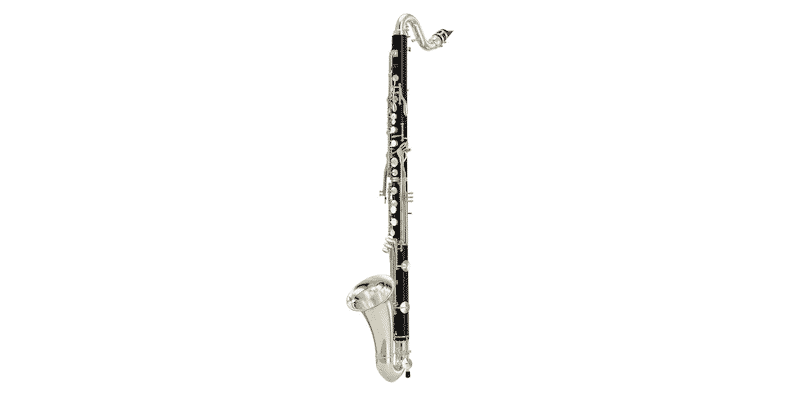
Yamaha’s 621 is a professional-quality bass clarinet still appropriate for intermediate use. Players find the tone warmer than other models with a range down to low Eb, and excellent response.
The rounded key connector at the bridge means keys don’t need to be held down (and potentially damaged) when putting the two pieces of the wood body together, which is an overall easy assembly.
A rubber ring surrounding the cork prevents any air leaks, and long-lasting leather keypads have plastic resonators that serve for enhanced projection. Intonation is found to be very accurate from the position of the scientifically precise tone hole. The bell of this bass clarinet is silver plated, and the neck position is similar to professional models, making it easy and comfortable to play.
The YCL-621 has a resin body with a matte finish that allows this instrument to be both durable and lightweight. This instrument comes with a stout, compact case and, as with all Yamaha wind instruments, comes with a five-year limited warranty.
6. Leblanc Model 60 Intermediate Bass Clarinet
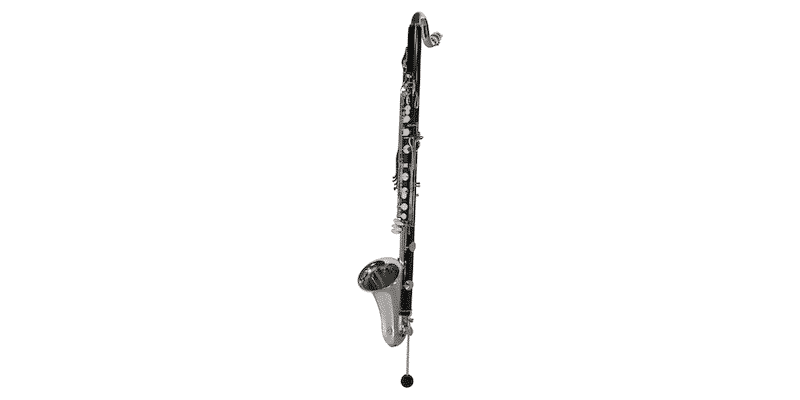
Rounding out our list of best-rated bass clarinets is the Leblanc Model 60. It is a solidly-built five-section bass clarinet made from beautiful unstained grenadilla wood with a hand-hammered bell. Customers can choose between having the bell, neck, and keywork either nickel or silver plated.
Intended for intermediate use, it nevertheless has comfortable keywork and produces a robust sound with good intonation—an ideal choice for any amateurs who don’t need a low C. For the price point, customers are happy with this bass clarinet’s performance and find that it has uniform sound in the high and low register, as well as consistent intonation.
This instrument is easy to assemble, easy to play with, and durably built. The Leblanc Model 60 comes with a standard five-section hardshell case, a hard rubber mouthpiece, cork grease, and a neck strap.
How To Choose A Bass Clarinet: A Buyer’s Guide
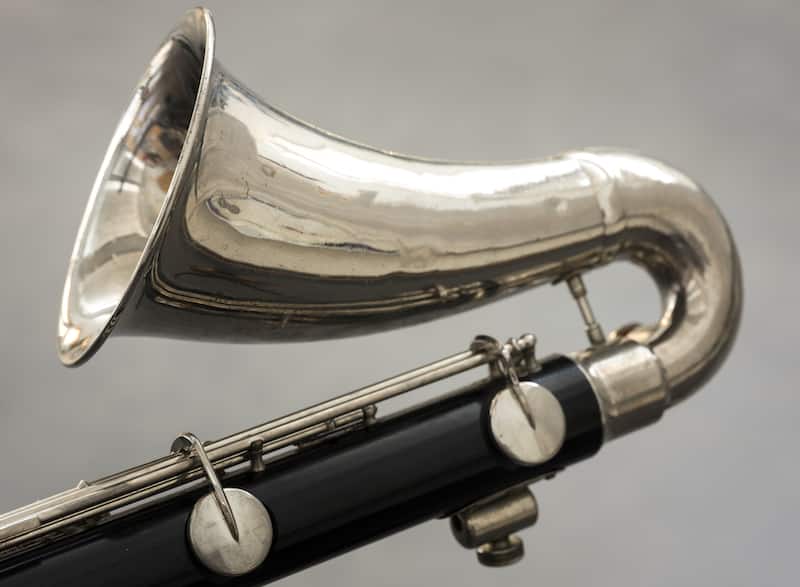
Like any other clarinet, there are a lot of things to consider when purchasing a bass clarinet.
This bigger instrument is going to cost even more than your smaller Bb clarinet, so you’ll want to ensure that you’re choosing the right bass clarinet so you don’t have to purchase another one in the near future.
Consider if you’re ready for the bass clarinet in the first place and then you can work on finding your ideal bass clarinet.
Related: See our post on buying an intermediate clarinet here.
Are You Ready For A Bass Clarinet?
The first question to ask is are you ready for a bass clarinet?
The bass clarinet isn’t recommended for beginners as it’s quite a bit more challenging and requires a lot more air than most other types of clarinet.
If you don’t have any clarinet experience, this likely isn’t the best place to start unless you have ample experience with other wind instruments.
Almost all clarinetists start by learning the Bb clarinet and branch out from there.
Related: For more information, check out our best clarinets for beginners post here.
Other Types Of Clarinets
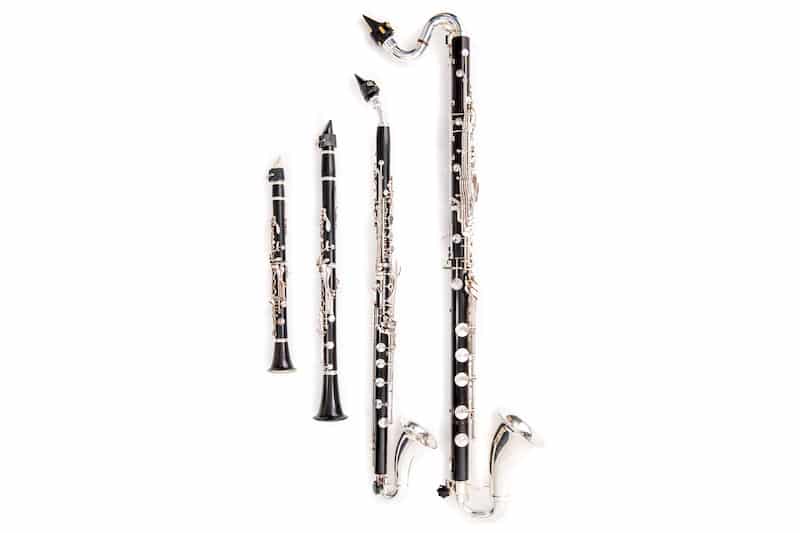
Although there are lots of different clarinet types, almost every clarinetist starts on the Bb clarinet, which is the standard clarinet that everyone is familiar with.
If you’re brand new to the clarinet and haven’t learned the Bb clarinet yet, it’s highly recommended that you start here as opposed to on the bass clarinet.
The Eb or A clarinet are two other popular soprano clarinets that may be a little easier to learn, so you could also opt for one of these too.
Regardless of where you start, there’s a good chance that you’ll have to learn the Bb clarinet somewhere along the line as a clarinetist.
It’s often considered to be the ideal place to start. From there, it should be relatively easy to pick up any other clarinet varieties that you may want to learn.
What Key Are Bass Clarinets In?
Almost all modern bass clarinets are made to play in the key of Bb.
That being said, you might be able to find a bass clarinet in A or C, although these are pretty rare, and ensembles typically don’t have written parts for these instruments so they don’t tend to be of much use.
In many ways, playing the bass clarinet is comparable to playing the common Bb clarinet, as it just plays an octave lower.
One of the main differences is that the range of the bass clarinet can vary depending on the model. Those with a smaller range play down to a low Eb, the same as the Bb clarinet. However, some bass clarinets can play down to a low C.
Typically the student models only go down to Eb, while the professional models will go down to a low C so make sure to check before purchasing what the lowest note is on yours.
Materials Used
The material composition of a bass clarinet matters for a number of reasons.
There are a few options of materials for the body of the bass clarinet and the key plating.
The Body
The material that makes up the body of a bass clarinet tends to be seen as being significantly more important than the key-plating.
The body is usually made from ABS plastic, ebonite, or wood. While there are a few different wood varieties that may be used, grenadilla is by far the most common.
ABS plastic and ebonite are both more durable, but the sound quality may not be quite what’s expected of the bass clarinet.
Only wooden clarinets produce the warm sound that the instrument is known for but obviously at a higher cost.
Typically student bass clarinets are made from ABS plastic or ebonite, while professional bass clarinets are almost exclusively made of grenadilla wood.
The Keys
The keys on a bass clarinet can be either nickel-plated or silver-plated. Nickel-plated keys are known for being more durable.
However, they tarnish more easily and usually never reach the same shine as silver-plated ones.
Silver-plated keys will increase the price of the bass clarinet from the getgo.
They’ll require more regular maintenance, but the shine of the silver-plated keys is often seen as the ideal aesthetic.
Many clarinetists don’t have much of a preference and think that the key plating is one of the easiest points to save money on when purchasing an instrument.
Student bass clarinets almost exclusively have nickel-plated keys while professional bass clarinets often come with a choice of nickel or silver-plated keys.
Key System
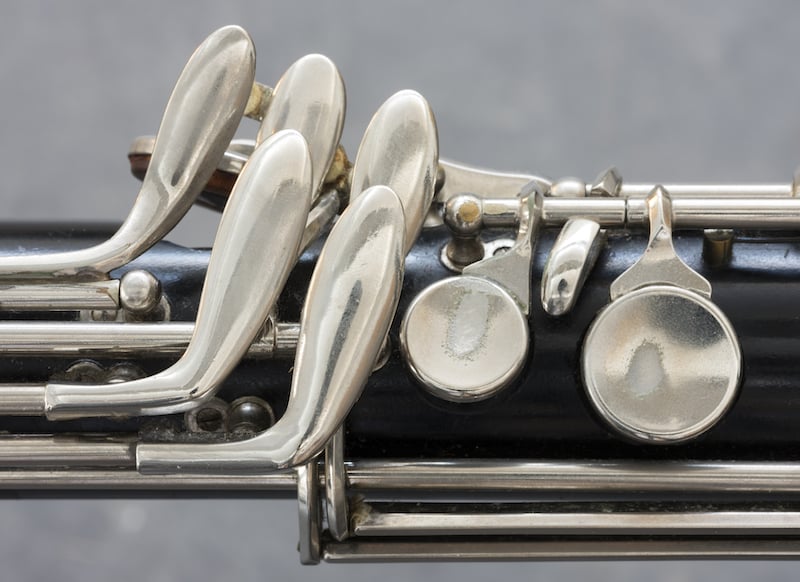
The bass clarinet is available in a few different key system options. Those with fewer keys start with a 17-key system and can range all the way up to a 24-key system.
There aren’t really any specific advantages or disadvantages to the different key systems and it’s mostly a matter of preference.
Sticking with the key system that you feel most comfortable playing may be the main factor in this decision.
Tone
For all varieties of clarinet, the desired tone is often described as warm and dark and the bass clarinet is no exception.
Wooden bass clarinets are known for consistently achieving this tonal quality. But, a wooden instrument doesn’t necessarily guarantee great quality.
There may be some solid student bass clarinets made from ABS plastic or ebonite that are also able to generate a nice tone.
They won’t have the same woody tone, but that may not be super distinguishable for beginners anyway.
Durability
The durability of a bass clarinet can be pretty subjective.
If you want something that can withstand more wear and tear, it’s best to look at an ebonite or ABS plastic bass clarinet with nickel-plated keys.
More advanced bass clarinetists may define durability as an instrument that will last longer with proper maintenance. In that case, you’ll definitely want to opt for a wooden clarinet. E
Either way, nickel-plated keys are easily the more durable option and are recommended if you’re a little rough on your instrument.
Mouthpiece and Reeds
The reeds and mouthpiece that you use are arguably the most important parts when determining the sound that you produce on the bass clarinet.
Both of these will have to be purchased separately from the bass clarinet itself.
If your bass clarinet comes with a mouthpiece, it’s likely what’s considered a stock mouthpiece.
These are almost always of subpar quality so you’ll most likely want to look into purchasing a higher quality one.
This is why many upper-level clarinets don’t even bother to include a mouthpiece in the first place.
Your band director or music instructor should be able to point you in the right direction when it comes to picking out the best bass clarinet mouthpiece based on your embouchure.
The reed you choose also matters as not all clarinet reeds are created equal.
Rico and Vandoren are some of the most commonly chosen with beginners tending to lean toward Rico and more advanced bass clarinetists tending to lean towards Vandoren.
The strength of the reed needed will be determined by your embouchure and skill level. The longer you play, the stronger of a reed you’ll use.
Beginners usually start at around a 2 or 2.5 reed.
For more information check out our post on what are the best clarinet reeds here.
Price and Budget
The price of a bass clarinet has a pretty wide range.
A student bass clarinet can start as low as $1,500 but higher quality student bass clarinets will usually cost at least $2,000 but may cost up to $7,000 depending on the model that you choose.
A top-of-the-line professional bass clarinet tends to run somewhere in the $10,000 to $15,000 range.
A bass clarinet is going to be a decent-sized investment regardless, so make sure you pick an instrument that you’re going to be happy within the long run instead of just picking up the cheapest one that you can find.
Best Brands of Bass Clarinet
Yamaha and Selmer are household names when it comes to getting quality band instruments.
They tend to be pretty evenly matched in terms of quality, but more bass clarinetists are loyal to the Yamaha brand than Selmer.
Yamaha bass clarinets tend to be slightly more consistent in quality, and they tend to be a little cheaper than a comparable Selmer as well.
If you’re looking for the absolute highest quality bass clarinet, Buffet Crampon is the way to go.
While they don’t have a household name like Yamaha or Selmer, Buffet Crampon produces some of the best woodwind instruments that you can find.
Buffet Crampon is often regarded as the golden standard for professional bass clarinets, but, as you’d expect, they tend to be significantly more expensive, but you get what you pay for in terms of quality.
Related: For more, check out our list of clarinet brands here.
Bass Clarinet FAQs
If you’re considering starting to play the bass clarinet, you may have some questions that we didn’t cover in our buying guide above.
There’s so much more to consider when picking out a bass clarinet than just the specs so we’ve answered some more questions below.
Q. Is the Bass Clarinet Harder than Other Clarinets?
This is a rather loaded question. It’ll be harder than the smaller clarinets in terms of the airflow needed to sustain the sound. It may also be difficult for younger students to adjust to the larger size of the bass clarinet. There aren’t too many differences between Bb clarinet and bass clarinet though, so it isn’t too hard to switch between the two.
Q. How Heavy is the Bass Clarinet?
ABS plastic bass clarinets tend to be the lightest. They typically weigh in the 15-20 pound range. A professional bass clarinet made out of grenadilla wood will weigh more. These tend to be in the 30-50 pound range. If this is a major factor for you, check the weight of the bass clarinet model you’re interested in before making a purchase.
Q. Can Beginners play the Bass Clarinet?
Beginners certainly can play the bass clarinet. However, it’s highly recommended to learn the Bb clarinet first. This will make learning the bass clarinet a lot easier and therefore increase your chances of successfully learning to play the instrument.
Q. What is the Range of a Bass Clarinet?
The range of a bass clarinet can vary somewhat depending on the model. Those with a smaller range play down to a low Eb which is the same as the Bb clarinet. However, some bass clarinets can play down to a low C. The range is usually prominently advertised on each model.
Conclusion: Which One Should You Buy?
Before choosing, consider both your amount and level of play carefully. All of the options listed above are respectable choices that will serve a player well.
If you are a student, an amateur, a teacher, or a doubler, the Selmer 1430LP in Bb is an ideal choice. The keywork is agile and requires little spanning for smaller hands.
Overall, this clarinet is easy to play and durable enough for school and band use. It requires no assembly with its single joint body, and the large bore emits a rich tone.
If you are a professional, set your sights on the Buffet Crampon Tosca bass clarinet. This is an instrument of the highest standard from a celebrated maker, with a lustrous tone and impeccable intonation.
The newly-developed register key system is nimble and can support the most demanding musician.
- Key Material : Nickel Silver
- Springs : Stainless Steel
- Ligature & Cap : Nickel Plated

